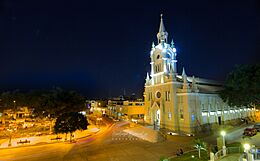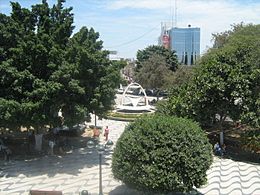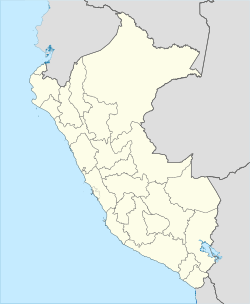Sullana facts for kids
Quick facts for kids
Sullana
|
||
|---|---|---|
|
||
| Nickname(s):
La Perla del Chira (The Chira's Pearl)
|
||
| Country | ||
| Region | Piura | |
| Province | Sullana | |
| Founded | July 8, 1783 | |
| Area | ||
| • Total | 488.01 km2 (188.42 sq mi) | |
| Elevation | 65 m (213 ft) | |
| Population | ||
| • Estimate
(2015)
|
201,302 | |
| Time zone | UTC-5 (PET) | |
| • Summer (DST) | UTC-5 (PET) | |
Sullana is an important city in Peru. It is the capital of the Sullana Province in the Piura area. You can find it on the north-western coast of Peru, in the Chira valley. About 162,500 people live here, making it one of the biggest cities in the Department of Piura.
Contents
Where is Sullana Located?
Sullana is located in the northern part of Peru. It is about 38 kilometers (24 miles) north of Piura, which is the capital city of the region.
What is the Climate Like?
Sullana has a tropical savanna climate. This means it's usually warm all year round. The average temperature is about 27°C (81°F). The coolest it gets is around 16°C (61°F), and the hottest can be 38°C (100°F). Sometimes, during the El Niño weather event, temperatures can even go above 42°C (108°F)!
The Chira River helps water the land around Sullana. This makes the area very fertile and green. You can see lots of tropical plants like Coconut palm trees and banana trees. There are also many paddy fields where rice is grown.
Sullana is a key place for trade, especially for cotton. It's one of Peru's main cotton-growing areas. Recently, a new sugar cane farm was started nearby. This farm will help produce ethanol, which is a type of fuel.
| Climate data for Sullana (Mallares), elevation 44 m (144 ft), (1991–2020) | |||||||||||||
|---|---|---|---|---|---|---|---|---|---|---|---|---|---|
| Month | Jan | Feb | Mar | Apr | May | Jun | Jul | Aug | Sep | Oct | Nov | Dec | Year |
| Mean daily maximum °C (°F) | 34.5 (94.1) |
35.0 (95.0) |
34.9 (94.8) |
34.1 (93.4) |
32.1 (89.8) |
30.2 (86.4) |
29.6 (85.3) |
29.8 (85.6) |
30.6 (87.1) |
30.9 (87.6) |
31.5 (88.7) |
33.1 (91.6) |
32.2 (90.0) |
| Mean daily minimum °C (°F) | 21.7 (71.1) |
23.0 (73.4) |
22.9 (73.2) |
21.6 (70.9) |
19.8 (67.6) |
18.6 (65.5) |
17.7 (63.9) |
17.4 (63.3) |
17.4 (63.3) |
17.7 (63.9) |
18.2 (64.8) |
19.7 (67.5) |
19.6 (67.4) |
| Average precipitation mm (inches) | 24.6 (0.97) |
49.9 (1.96) |
78.1 (3.07) |
21.6 (0.85) |
4.1 (0.16) |
0.4 (0.02) |
0.2 (0.01) |
0.0 (0.0) |
0.1 (0.00) |
1.0 (0.04) |
1.1 (0.04) |
9.4 (0.37) |
190.5 (7.49) |
| Source: National Meteorology and Hydrology Service of Peru | |||||||||||||
Who Lives in Sullana?
Many people have moved to Sullana over the years. In 1981, about 112,770 people lived there. By 1993, the population grew to 147,361. In 2005, it was around 162,500. Even with many new people, you don't see as many "pueblos jóvenes" (which are like informal settlements) in Sullana as you might in other cities like Piura.
A Look at Sullana's History
The Chira valley has always been an important place for farming. Before the Spanish arrived, different groups of people lived here. These included the Tallanes, the Mochicas, the Chimú, and later the Incas.
The Spanish chose this region to build their very first city in this part of the Americas. They named it San Miguel de Tangarara, and it was founded on July 15, 1532. The Spanish changed how farming was done by the native people.
Sullana itself was founded much later, on July 8, 1783. A bishop named Baltazar Jaime Martínez de Compañon y Bufanda gave it the original name "El Principe," meaning "The Prince."
Getting Around Sullana
Sullana has good bus connections. You can take a bus north, or south to Piura. There are also buses that go inland to Ayabaca and to La Tina, which is on the border with Ecuador. A special road called the Canal Vía runs through the city. There are also plans for a new train line called the Tren de la Costa.
Fun Things to Do in Sullana
If you visit Sullana, you can enjoy some fun activities!
- In the first week of January, there's a big celebration called the Feria Internacional de los Reyes (International Fair of the Kings).
- About 27 kilometers (17 miles) from the city is the Poechos Reservoir. This is a great place for water sports! You can go water skiing, motor-boating, fishing, and swimming.
See also
 In Spanish: Sullana para niños
In Spanish: Sullana para niños
 | William L. Dawson |
 | W. E. B. Du Bois |
 | Harry Belafonte |











